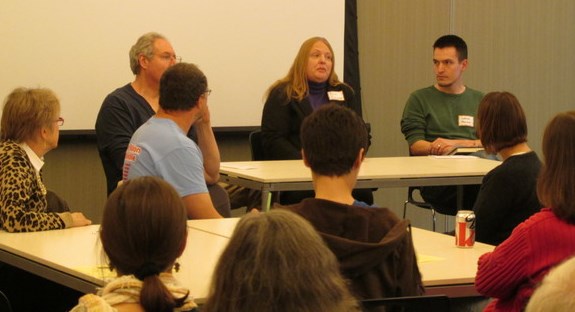By Charity Campbell
 The Minnesota Atheists November meeting featured small-group discussions on topics such as dealing with religious relatives, death and dying, and morality.
The Minnesota Atheists November meeting featured small-group discussions on topics such as dealing with religious relatives, death and dying, and morality.
In the discussion about religious relatives, it was agreed that the holiday season is an especially appropriate time to share more about one’s religious beliefs with family members, but that atheists are often cautious about doing so for fear that it may ruin the good spirits that the season is supposed to bring. Holidays are something that we atheists still celebrate despite the close association with religion that many of them have. Other types of religious rituals that some of us still participate in include infant baptism and Jewish rites of passage.
The group talking about death and dying concluded that the deceased should still be honored, but that we should try to avoid any talk about religion to their friends and family. Our children should also be taught what we think about death, in contrast to what many others believe. Even if death is seen as merely the end of life, it does not take away meaning from life.
Another group stated that conflicting beliefs about religion are often the result of the way people grew up. Our beliefs about free will, with or without a god, and our actions in many aspects of our life are also the result of how we were brought up as well as our current environment.
And the problem of evil? “It’s not our problem, since it’s you Christians who are evil!” one participant joked. Theists tend to claim that what is good and bad is defined by their god, usually as revealed in the Bible. Some theists even assume that practices related to their definition of evil are also evil, such as birth control and abortion, and that natural disasters are God’s retribution for people’s sin and incorrect beliefs. Evangelicals have even blamed the hurricane in the Philippines on the widespread Catholicism of the Filipinos! But we atheists try to take a more logical approach to what is considered evil.
One small group, along with the entire Minnesota Atheists meeting group, discussed the idea that the origin and maintenance of morality is based upon a variety of factors. Natural processes of evolution, social contacts, and trade help us decide what is good and what is bad. However, there are still grey areas in morality. What if the greater good requires making some people slaves or impels us to engage in a war? Morality has always involved trade-offs, but in recent times more and more people have taken the side of the oppressed. We wold like to think that we atheists are among them.
If morality does not come from a god, does the universe come from a god? Just because the universe appears complex does not mean it has to have been designed. In fact, much of the complexity seen on Earth has evolved through natural selection. The watchmaker analogy was thoroughly debunked; something that is not part of nature cannot always be compared to something that is. Moreover, since it appears that there are many different universes, the Biblical account of creation seem sadly lacking. And why does the god of the Bible have to be the designer anyway? Why not Allah or Zeus, who have also been claimed to be the creator of the universe?
All these ideas and many more were part of the small-group discussion format at the November meeting. This format worked very well and gave everyone who came much to think about.
Charity Campbell is a 26-year-old who recently earned a bachelor’s degree from Metropolitan State University in St. Paul with a concentration in online communication. She grew up in a strict Christian family, but after doing online research about a year ago, she realized that there really is no reason to believe in a god, let alone the Bible, and considered herself an atheist from then on. She loves events, meetings, and the internet, She hopes to be an online planner and promoter for live entertainment and social advocacy.

